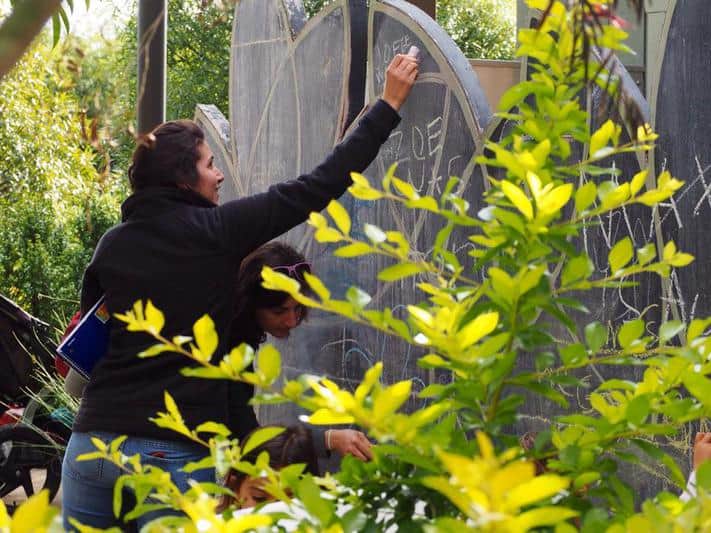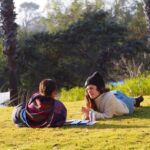by Bailey Lininger – Tamarak Camps, Ortonville MI
Renewing our Connections
Editor’s Note: Welcome to D’varim HaMakom: The JOFEE Fellows Blog! Most weeks throughout the year, you’ll be hearing from the JOFEE Fellows: reflections on their experiences, successful programs they’ve planned and implemented, gleanings from the field, and connections to the weekly Torah portion and what they’ve learned from their experiences with place in their host communities for the year. Views expressed are the author’s and do not necessarily represent Hazon. Be sure to check back weekly!
Parshat Mikeitz
At the beginning of December, the current cohort of JOFEE Fellows convened for the first time since our initial training seminar in June. We traveled, some of us for just a few miles, others for thousands, and came together at the Leichtag Commons property in Encinitas, California. There, we had the privilege of spending five days together. We learned, collaborated, challenged and celebrated each other, and renewed our passion for the work that we are doing as JOFEE fellows across the country.
This week, the Torah portion is Mikeitz, and it begins with a story of Joseph helping Pharaoh to interpret his dreams. When reading this passage, I was struck by the sense of clarity that Pharaoh had after speaking with Joseph, and how grateful I was to have had that same sense of clarity bestowed upon me after many conversations with other JOFEE fellows. A central goal of our mid-year seminar was to allow us to connect and re-connect with each other, as well as find support and fresh perspective on challenges we may be facing in our work.
Rachel Binstock and Emily Glick, chatting on the lawn of Leichtag Commons Photo Credit: Yoshi Silverstein
I, for example, spent time work-shopping programs with Mira Menyuk, a fellow at the Pearlstone Center and Danielle Smith, a fellow at Eden Village Camp. We focused on how to create programs that are successful off-site or in winter, and puzzled through the challenges that come with running JOFEE programs either a) inside or b) in cold weather. Our conversation gave us the chance to see our challenges through one another’s eyes, and thus discover solutions where we might not have been able to otherwise.

Bailey Lininger, Mira Menyuk, and Danielle Smith brainstorm program ideas Photo Credit: Yoshi Silverstein
Over the week, our small group conversations and collaborations fed into a larger theme that arose in our mid-year seminar: coalition-building. Our host, the Leichtag Foundation, is itself part of a coalition called the E3 Cluster that seeks to enrich the Encinitas community through increasing access to high-quality environmental and educational experiences. As part of our seminar, we visited three of the six members of this coalition—the San Dieguito Heritage Museum, the San Diego Botanic Garden, and Farm Lab, an educational farm for the local school district. These organizations, along with three others, work together to create programs and opportunities for their community that, would not be possible if they worked alone. The senior living community in the coalition, for example, provides docents and volunteers for the Botanic Garden and Heritage Museum, who bring children from the local public school district to their programs for regular field trips. The Farm Lab and Leichtag partner to ensure that work happening at Farm Lab excels in both the agricultural and educational fields, benefiting both their natural and human communities.

Nicole Cruz and Mira Menyuk explore the Children’s Garden at the San Diego Botanical Gardens Photo Credit: Yoshi Siverstein
After we returned from these field sites, we reflected upon our own experiences in coalition-building. What organizations did we have in our own communities that we could partner with to increase the impact of our work? Who aren’t we engaging right now, and how can we get there? I immediately thought of the multi-generational community of my own JOFEE host site, Tamarack Camps, and how we could reach out to our elders for their support and wisdom in the work that we do as a summer camp and outdoor education program. Another fellow brought up the idea of working with a nearby outdoor center to create some complementary programming that her organization isn’t large enough to provide on their own.
As educators dispersed across the country and working for a wide variety of organizations, it isn’t always easy to stay connected to the national JOFEE community. The mid-year seminar gave us as fellows a chance to re-connect, share, and support each other in ways we may not have thought of before we started our fellowship. I’m sure I speak for more fellows than just myself when I say that I eagerly look forward to seeing the transformative, meaningful work that arises from the conversations and collaborations we had in California.

